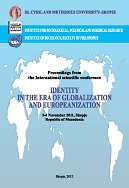THE HOLLY GRAIL AND THE ALTER EGO: BALKANS AS A SOURCE OF THE RUSSIAN EXCEPTIONALITY IN THE LATE SOVIET AND EARLY RUSSIAN DISCOURSE
THE HOLLY GRAIL AND THE ALTER EGO: BALKANS AS A SOURCE OF THE RUSSIAN EXCEPTIONALITY IN THE LATE SOVIET AND EARLY RUSSIAN DISCOURSE
Author(s): Vsevolod SamokhvalovSubject(s): Politics / Political Sciences
Published by: Институт за социолошки и политичко-правни истражувања
Summary/Abstract: The paper is based on the inter-disciplinary research project, which studies the process of relational identity construction and the Russian foreign policy. Following the constructivist epistemology and methodology of intertextuality, the paper will study main texts that defined the Russia’s Great Power identity: school and university textbooks, major history works, most popular history novels and media discourse. The author looks into the concept of identity as expressed by the term of Russia’s Great Powerhood linked to the idea of Europe. The working hypothesis of the research project is that Russia’s idea of Great Powerhood was always exercised/implemented in/through Russia’s interaction with Europe. The Balkans take special role in the role of the Russian identity construction. Departing from the facts of certain historical borrowings the Balkans the discourse evolves to reconstruct the Balkans as the source of the Russian Greatness. Embedded in the Soviet discourse through the textbooks and fiction literature in the 1960s, the discourses penetrates numerous texts in the media discourse in the late 1980s. The paper further analyzes evolution of the discourse in the Russian period. It identifies certain deconstruction of the Holy Grail that take place, introduction of orientalist elements and adjustment of the discourse to new realities.
Journal: Proceedings from the International scientific conference
- Issue Year: 2012
- Issue No: 1
- Page Range: 537-549
- Page Count: 13
- Language: English
- Content File-PDF

